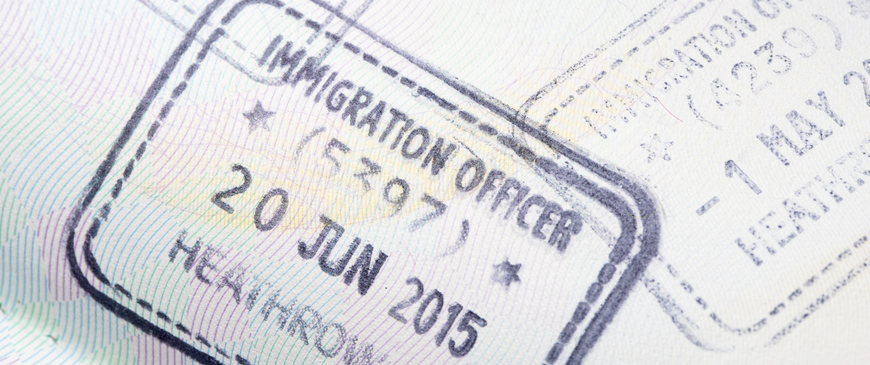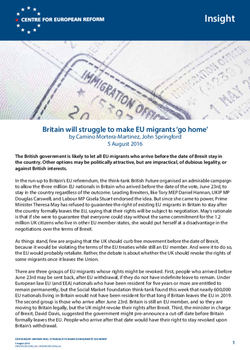
Britain will struggle to make EU migrants ‘go home’
The British government is likely to let all EU migrants who arrive before the date of Brexit stay in the country. Other options may be politically attractive, but are impractical, of dubious legality, or against British interests.
In the run-up to Britain’s EU referendum, the think-tank British Future organised an admirable campaign to allow the three million EU nationals in Britain who arrived before the date of the vote, June 23rd, to stay in the country regardless of the outcome. Leading Brexiters, like Tory MEP Daniel Hannan, UKIP MP Douglas Carswell, and Labour MP Gisela Stuart endorsed the idea. But since she came to power, Prime Minister Theresa May has refused to guarantee the right of existing EU migrants in Britain to stay after the country formally leaves the EU, saying that their rights will be subject to negotiation. May’s rationale is that if she were to guarantee that everyone could stay without the same commitment for the 1.2 million UK citizens who live in other EU member-states, she would put herself at a disadvantage in the negotiations over the terms of Brexit.
As things stand, few are arguing that the UK should curb free movement before the date of Brexit, because it would be violating the terms of the EU treaties while still an EU member. And were it to do so, the EU would probably retaliate. Rather, the debate is about whether the UK should revoke the rights of some migrants once it leaves the Union.
There are three groups of EU migrants whose rights might be revoked. First, people who arrived before June 23rd may be sent back, after EU withdrawal, if they do not have indefinite leave to remain. Under European law EU (and EEA) nationals who have been resident for five years or more are entitled to remain permanently, but the Social Market Foundation think-tank found this week that nearly 600,000 EU nationals living in Britain would not have been resident for that long if Britain leaves the EU in 2019. The second group is those who arrive after June 23rd. Britain is still an EU member, and so they are moving to Britain legally, but the UK might revoke their rights after Brexit. Third, the minister in charge of Brexit, David Davis, suggested the government might pre-announce a cut-off date before Britain formally leaves the EU. People who arrive after that date would have their right to stay revoked upon Britain’s withdrawal.
Britain is debating if recent EU migrants shld stay post #Brexit. It will struggle to send them home
There are bureaucratic, legal and political reasons why, in all likelihood, Britain will have to give all EU nationals who move to the UK before the date of Brexit – not the date of the referendum or another cut-off point – the right to stay. Jonathan Portes of the National Institute of Economic and Social Research points out that Britain does not have a database of EU nationals who are in the country, so the government does not know when people arrived in the UK. It could set up a register, and mandate that EU citizens currently in the UK provide evidence of the date of their arrival. (EU law allows member-states to ask EU nationals to register after they have been living in the country for three months). After Britain formally leaves the EU, the government could demand that employers check residence documents and reject applicants who arrived after any cut-off date (June 23rd, for example). And the government could refuse access to public services and benefits to those who came too late. But this would be a costly exercise, requiring the processing of millions of people’s application forms, which the Home Office does not currently have the staff or budget for. (The Migration Observatory found that, under the current system, it would take around 140 years to register EU migrants living in the UK.) And many people would not be able to provide evidence of their date of arrival, which would lead to challenges in the courts.
Portes suggests that social security numbers – national insurance numbers, or NINos – could be used to identify people who should be allowed to stay. The NINo database records the nationality of people. But the database only records when the NINo was issued, not the date of arrival, and over a million people with NINos may have returned to their home country or another EU member-state. If NINos were used, these people would be allowed to return to the UK to work, while EU nationals living in Britain but who do not have a national insurance number – either because they have not worked in the UK, or are unable to do so – would be denied residence rights.
By removing rights retroactively, the UK would make many EU workers either return home or continue to work illegally. Most would probably move to their home country or another EU member-state. But others would move into the black economy: they would not pay taxes, and they would be more likely to be exploited by employers.
Such a move might also be illegal. The 1969 Vienna Convention on the Law of Treaties says that if a country decides to withdraw from an international treaty (as would be the case when the UK withdraws from the EU’s treaties), the “rights, obligations and legal situation of the parties (…) created prior to its termination” should not be affected. Legal scholars, such as Steve Peers and Damian Chalmers, believe that the Vienna Convention alone would not guarantee the rights of EU citizens living in the UK after Brexit. But even if that were the case, EU citizens already in the UK may be able to resort to British law to defend their rights. The rule of law, upheld in Britain by both the Magna Carta and the Bill of Rights, is underpinned by the principle of legal predictability, whereby citizens should be able to organise their affairs according to the applicable law at any given moment. It follows that laws with retroactive effects (also known as ‘ex post facto’) should be disallowed by the courts.
The EU, courts & bureaucratic difficulties will make it hard for Britain to send #EUmigrants home
The prohibition of ‘ex post facto’ laws is less clear in Britain than in other countries, because of the principle of parliamentary sovereignty by which no parliament can pass laws that future parliaments cannot change. But, as the law academic Helena Wray pointed out in 2014, British courts have in the past taken the view that the principle of legal certainty should prevail: in two cases from 2008 and 2009, the High Court of Justice was asked to decide on the legality of changes introduced to a scheme to attract highly skilled migrants to the UK. These changes resulted in expulsion orders for those who had been living in Britain lawfully, as they had qualified under the scheme’s previous requirements but did not pass the new eligibility test. The court concluded that such changes breached the principle of legal predictability, and were therefore illegal.
Of course, EU migrants who arrive after June 23rd would be less able to rely on the principle of legal predictability than those already in the country before the referendum took place. If the British government announces a cut-off date, those arriving after the announcement would do so after a clear warning that they may risk expulsion. But this would still be legally dubious. Consider a Polish national who has been in a lengthy engagement to a British citizen, marries him and moves to Britain after the cut-off date, but before Brexit. She may still go to British courts to make her case on human rights grounds (the right to a family life), and invoke the principle of legal predictability, as she may have invested time and money in planning her move to Britain under the assumption that, because the UK was a member of the EU, she was entitled to do so.
If the UK applies retroactive restrictions after it has left the EU, the European Court of Justice (ECJ) and the European Commission would be powerless to stop it. By the time those restrictions would apply, the UK would no longer be part of the EU, so the EU could neither impose fines on Britain nor force it to comply with EU law. But the EU will seek a commitment from the UK that no such move is made in the forthcoming negotiation over the terms of Brexit, in which free movement rights will be central. If Britain were to remove the rights of hundreds of thousands of EU workers who had come to Britain legally, the EU would retaliate with similar rules for British nationals living on the continent. Without a firm commitment that it will not remove residence rights after Brexit, the EU would also be unlikely to commit to generous market access for British exporters. And the EU might only agree to a transitional regime between formal Brexit and the signing of a free trade agreement, which is likely to take many years, if the UK maintained migrants’ rights.
There are bureaucratic, legal & political reasons why the UK will let EU migrants stay after #Brexit
For practical and political reasons, then, the UK may have to respect the rights of all people who move to the UK before the date of Brexit. This will obviously cause domestic political problems for Theresa May. The absence of a pre-Brexit cut-off date would strengthen incentives for EU citizens to migrate before Britain formally withdraws. But EU migration to the UK is likely to fall in any case, partly because the British economy is weakening, partly because the eurozone economy is improving, and partly because people will not want to move to a country with an atmosphere of hostility towards migrants.
During her recent visit to Warsaw, May said that “today, the UK is still a member of the EU, as a member of the EU it maintains both its obligations and its rights. Until the UK formally leaves the EU, nothing changes”. She did not say that Britain would protect migrants’ rights when the country is no longer bound by EU law. Ultimately, the EU, the courts and the sheer bureaucratic effort required to identify and expel EU migrants are likely to force her hand.
Camino Mortera-Martinez is a research fellow and Brussels representative and John Springford is a senior research fellow at the CER.


Add new comment